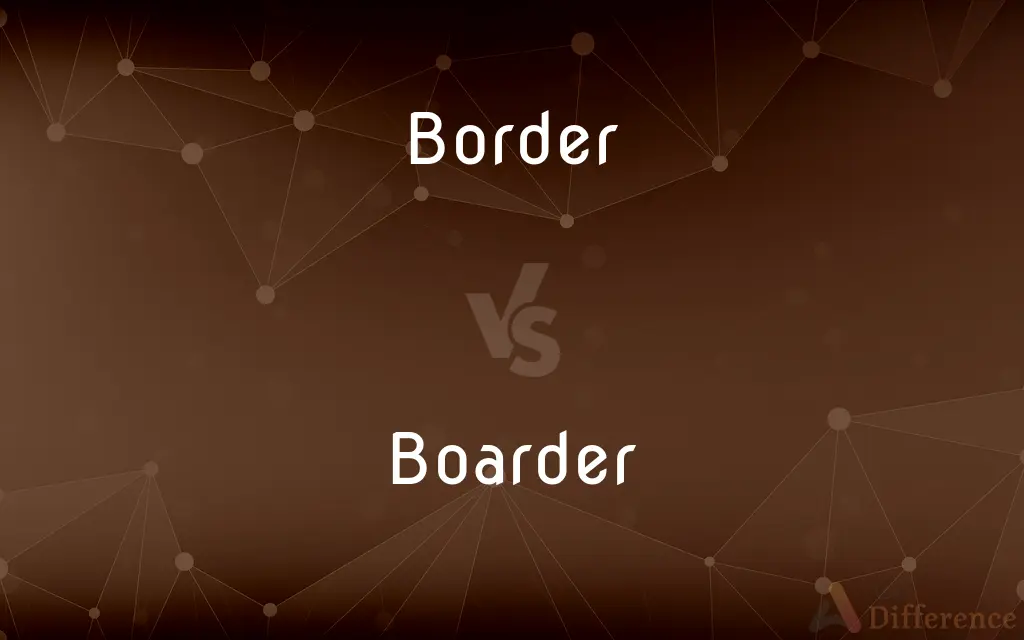Border vs. Boarder — What's the Difference?
By Tayyaba Rehman & Maham Liaqat — Updated on March 12, 2024
Border refers to the edge or boundary of a surface or area, while a boarder is someone who rents a room or space within a house. Borders are geographical or spatial limits, whereas boarders are individuals engaged in a rental agreement.

Difference Between Border and Boarder
Table of Contents
ADVERTISEMENT
Key Differences
Borders define the limits of a geographic area, such as countries or states, marking where one jurisdiction ends and another begins. On the other hand, a boarder refers to a person who lives in part of someone else's house, often with meals or services provided, under an arrangement that typically involves payment.
Borders can also refer to the edges of objects, such as the border of a page or a garden, indicating the transition from one space to another. Whereas boarders are associated with lodging and living arrangements, highlighting a social and economic relationship rather than a physical delineation.
In terms of legal and political significance, borders have vast implications for trade, migration, and sovereignty, defining the scope of governance and law enforcement. Meanwhile, boarders engage in a private agreement with a property owner, affecting primarily individual or household dynamics without broader geopolitical impact.
Borders are subject to international laws and agreements, often guarded and managed by governments to control movement and trade. In contrast, boarders and their accommodations are regulated by local laws and personal contracts, focusing on the rights and responsibilities within the housing arrangement.
While borders can change due to political agreements or conflicts, altering the geographical and political landscape, the status of a boarder is more transient, dependent on personal circumstances and agreements that can be renegotiated or terminated by either party involved.
ADVERTISEMENT
Comparison Chart
Definition
The edge or boundary of a surface or area.
Someone who rents a room or space within a house.
Context
Geographical, political, or spatial.
Housing and living arrangements.
Legal Significance
Subject to international laws and agreements.
Governed by local laws and personal contracts.
Changeability
Can change due to political agreements or conflicts.
Status can change based on personal circumstances.
Management
Often guarded and managed by governments.
Managed through private agreements between individuals.
Compare with Definitions
Border
A line separating two political or geographical areas.
The border between Canada and the United States is the longest international boundary.
Boarder
An individual engaged in a temporary lodging arrangement.
The seaside inn welcomes boarders during the summer season.
Border
The boundary of a surface or area.
The map showed the border of the desert region clearly.
Boarder
A person who receives regular meals in return for payment.
The elderly lady took in a boarder to help with expenses.
Border
A strip forming the outer edge of something.
The garden border is filled with tulips in spring.
Boarder
A student living in school premises.
Boarders at the academy follow a strict curfew.
Border
A boundary separating distinct areas of activity or subjects.
The discussion touched upon topics at the border of ethics and law.
Boarder
Someone renting a room in a private home.
Our new boarder works at the local university.
Border
The edge of a piece of cloth or paper.
She embroidered flowers along the border of the tablecloth.
Boarder
A tenant in a boarding house.
The boarder had his own room but shared the bathroom with two others.
Border
Borders are geographic boundaries, imposed either by geographic features such as oceans, or by arbitrary groupings of political entities such as governments, sovereign states, federated states, and other subnational entities. Borders are established through warfare, colonization, or simple symbiotic agreements between the political entities that reside in those areas; the creation of these agreements is called boundary delimitation.
Boarder
One who pays a stipulated sum in return for regular meals or for meals and lodging.
Border
A part that forms the outer edge of something.
Boarder
One who goes on board a vessel as part of an assault or military action.
Border
A decorative strip around the edge of something, such as fabric.
Boarder
A person who rides a board, such as a snowboard or surfboard, as a sport.
Border
A strip of ground, as at the edge of a garden or walk, in which ornamental plants or shrubs are planted.
Boarder
A pupil who lives at school during term time.
The student body consisted primarily of boarders, except for a few children belonging to the school staff.
Border
The line or frontier area separating political divisions or geographic regions; a boundary.
Boarder
Someone who pays for meals and lodging in a house rather than a hotel.
When I left for college, my parents took on a boarder in my old room to help defray expenses.
Border
To lie along or adjacent to the border of
Canada borders the United States.
Boarder
One who boards a vehicle.
Border
To put a border on.
Boarder
(nautical) A sailor attacking an enemy ship by boarding her, or one repelling such attempts by an enemy.
The captain shouted at the crew to grab arms and repel boarders.
Border
To lie adjacent to another
The United States borders on Canada.
Boarder
Someone who takes part in a boardsport, such as surfing or snowboarding.
A group of boarders swept past us as we climbed the side of the ski run.
Border
To be almost like another in character
An act that borders on heroism.
Boarder
One who has food statedly at another's table, or meals and lodgings in his house, for pay, or compensation of any kind.
Border
The line or frontier area separating political or geographical regions.
The border between Canada and USA is the longest in the world.
Boarder
One who boards a ship; one selected to board an enemy's ship.
Border
The outer edge of something.
The borders of the garden
Boarder
A tenant in someone's house
Border
A decorative strip around the edge of something.
There's a nice frilly border around the picture frame.
A solid border around a table of figures
Boarder
Someone who forces their way aboard ship;
Stand by to repel boarders
Border
A strip of ground in which ornamental plants are grown.
Boarder
A pupil who lives at school during term time
Border
Border morris or border dancing; a vigorous style of traditional English dance originating from villages along the border between England and Wales, performed by a team of dancers usually with their faces disguised with black makeup.
Border
(computing) A string that is both a prefix and a suffix of another particular string.
Border
(transitive) To put a border on something.
Border
(transitive) To form a border around; to bound.
Border
(transitive) To lie on, or adjacent to, a border of.
Denmark borders Germany to the south.
Border
(intransitive) To touch at a border (with on, upon, or with).
Connecticut borders on Massachusetts.
Border
(intransitive) To approach; to come near to; to verge (with on or upon).
Border
The outer part or edge of anything, as of a garment, a garden, etc.; margin; verge; brink.
Upon the borders of these solitudes.
In the borders of death.
Border
A boundary; a frontier of a state or of the settled part of a country; a frontier district.
Border
A strip or stripe arranged along or near the edge of something, as an ornament or finish.
Border
A narrow flower bed.
Border
To touch at the edge or boundary; to be contiguous or adjacent; - with on or upon as, Connecticut borders on Massachusetts.
Border
To approach; to come near to; to verge.
Wit which borders upon profaneness deserves to be branded as folly.
Border
To make a border for; to furnish with a border, as for ornament; as, to border a garment or a garden.
Border
To be, or to have, contiguous to; to touch, or be touched, as by a border; to be, or to have, near the limits or boundary; as, the region borders a forest, or is bordered on the north by a forest.
The country is bordered by a broad tract called the "hot region."
Shebah and Raamah . . . border the sea called the Persian gulf.
Border
To confine within bounds; to limit.
That nature, which contemns its origin,Can not be bordered certain in itself.
Border
A line that indicates a boundary
Border
The boundary line or the area immediately inside the boundary
Border
The boundary of a surface
Border
A decorative recessed or relieved surface on an edge
Border
A strip forming the outer edge of something;
The rug had a wide blue border
Border
Extend on all sides of simultaneously; encircle;
The forest surrounds my property
Border
Form the boundary of; be contiguous to
Border
Enclose in or as if in a frame;
Frame a picture
Border
Provide with a border or edge;
Edge the tablecloth with embroidery
Border
Lie adjacent to another or share a boundary;
Canada adjoins the U.S.
England marches with Scotland
Common Curiosities
How do borders affect international relations?
Borders have significant implications for trade, migration, and security, influencing diplomatic and economic relations between countries.
What defines a border?
A border is defined as the edge or boundary of a surface or area, often with legal or political significance.
What is a boarder?
A boarder is someone who rents a room or space within a house, usually with some services like meals included.
What legal agreements govern boarders?
Boarders are governed by local housing laws and personal rental agreements or contracts.
Are boarders always provided meals?
Not always; the provision of meals depends on the agreement between the boarder and the property owner.
How do I become a boarder?
Becoming a boarder typically involves finding a suitable living arrangement and agreeing to terms with the property owner.
Can a border change?
Yes, borders can change due to political agreements, conflicts, or environmental changes.
Can borders affect the environment?
Yes, borders can impact environmental management, especially in areas where natural habitats span multiple jurisdictions.
How are border disputes resolved?
Border disputes are typically resolved through diplomatic negotiations, international arbitration, or legal proceedings.
What is the difference between a border and a boundary?
A border specifically refers to the dividing line between geographical areas, while a boundary can be any line or limit, not necessarily geographical.
Can a border be natural?
Yes, borders can be natural, like rivers or mountain ranges, or artificial, determined by human agreements.
Do all countries have defined borders?
Most countries have defined borders, but some areas, especially disputed territories, may have unclear or contested boundaries.
Are there international laws for borders?
International laws and agreements, such as treaties, govern the creation and management of borders between countries.
What are the responsibilities of a boarder?
Responsibilities may include paying rent on time, following house rules, and maintaining cleanliness in shared spaces.
What impact do borders have on migration?
Borders regulate the movement of people between countries, impacting immigration policies and practices.
Share Your Discovery

Previous Comparison
Anopsia vs. Anopia
Next Comparison
Diagnosis vs. DiagnosesAuthor Spotlight
Written by
Tayyaba RehmanTayyaba Rehman is a distinguished writer, currently serving as a primary contributor to askdifference.com. As a researcher in semantics and etymology, Tayyaba's passion for the complexity of languages and their distinctions has found a perfect home on the platform. Tayyaba delves into the intricacies of language, distinguishing between commonly confused words and phrases, thereby providing clarity for readers worldwide.
Co-written by
Maham Liaqat














































